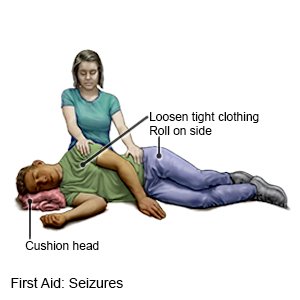Temporal Lobe Seizures
Medically reviewed by Drugs.com. Last updated on Aug 4, 2025.
AMBULATORY CARE:
A seizure
is an abnormal burst of electrical activity in your brain. A temporal lobe seizure starts in the temporal lobe of the brain. One temporal lobe is on each side of the brain, near the temples. This part of the brain controls memory, emotions, and language processing. A temporal lobe seizure is called a focal seizure because it starts in one part of your brain. The seizure may last 60 to 90 seconds. It may be simple or complex. Simple means you stay aware of your surroundings. Complex means you lose awareness. The seizure can become a generalized tonic-clonic (grand mal) seizure. This may cause you to have convulsions.
Call your local emergency number (911 in the US) for any of the following:
- Your seizure lasts longer than 5 minutes.
- You have trouble breathing after a seizure.
- You have diabetes or are pregnant and have a seizure.
- You have a seizure in water, such as a swimming pool or bathtub.
Seek care immediately if:
- You have a second seizure within 24 hours of the first.
- You are injured during a seizure.
Call your doctor if:
- You feel you are not able to cope with temporal lobe seizures.
- Your seizures start to happen more often.
- You are confused longer than usual after a seizure.
- You are planning to get pregnant or are currently pregnant.
- You have questions or concerns about your condition or care.
Common signs and symptoms of a temporal lobe seizure:
- An aura (warning sign of a seizure), such as nausea or smelling something that is not real
- Staring with no awareness of your surroundings
- Not responding when spoken to
- Sudden bursts of anger or aggression
- Lip smacking, chewing, or picking at your clothes without knowing you are doing it
- Confusion and speech or behavior problems after a seizure
- A headache or muscle pain after a seizure
Treatment:
The goal of treatment is to try to stop your seizures completely. You may need any of the following:
- Medicines will help control your seizures. You may need medicine daily to prevent seizures or during a seizure to stop it. Do not stop taking your medicine unless directed by your healthcare provider.
- Surgery may help reduce how often you have seizures if medicine does not help. Ask your healthcare provider for more information about surgery.
What you can do to prevent a seizure:
You may not be able to prevent every seizure. The following can help you manage triggers that may make a seizure start:
- Take your medicine every day at the same time. This will also help prevent medicine side effects. Set an alarm to help remind you to take your medicine every day.
- Manage stress. Stress can be a trigger for seizures. Exercise can help you reduce stress. Talk to your healthcare provider about exercise that is safe for you. Illness can be a form of stress. Eat a variety of healthy foods and drink plenty of liquids during an illness. Talk to your healthcare provider about other ways to manage stress.
- Set a regular sleep schedule. A lack of sleep can trigger a seizure. Try to go to sleep and wake up at the same times every day. Keep your bedroom quiet and dark. Talk to your healthcare provider if you are having trouble sleeping.
- Limit or do not drink alcohol as directed. Alcohol can trigger a seizure, especially if you drink a large amount at one time. A drink of alcohol is 12 ounces of beer, 1½ ounces of liquor, or 5 ounces of wine. Talk to your healthcare provider about a safe amount of alcohol for you. Your provider may recommend that you do not drink any alcohol. Tell him or her if you need help to quit drinking.
What you can do to manage temporal lobe seizures:
- Keep a seizure diary. This can help you find your triggers and avoid them. Possible triggers include illness, lack of sleep, hormonal changes, alcohol, drugs, lights, and stress. Write down the dates of your seizures, where you were, and what you were doing. Include how you felt before and after the seizure.
- Record any auras you have before a seizure. The aura may happen seconds before a seizure, or up to an hour before. You may feel, see, hear, or smell something. Examples include part of your body becoming hot. You may see a flash of light or hear something. You may have anxiety or déjà vu. If you have an aura, include it in your seizure diary.
- Ask what safety precautions you should take. Talk with your healthcare provider about driving. You may not be able to drive until you are seizure-free for a period of time. You will need to check the law where you live. Also talk to your healthcare provider about swimming and bathing. You may drown or develop life-threatening heart or lung damage if you have a seizure in water.
- Carry medical alert identification. Wear medical alert jewelry or carry a card that says you had a seizure. Ask your healthcare provider where to get these items.

What you need to know about stopping your medicine:
Your healthcare provider can help you understand and make decisions about continuing or stopping antiseizure medicines. Do not stop taking the medicine until your provider says it is okay. You may need to be seizure free for 18 to 24 months before you can stop your medicine. Seizures might happen again while you stop taking the medicine, or after you stop. Rarely, these seizures no longer respond to medicines. Tests such as an EEG may be useful in helping you and your provider make medicine decisions.
How others can keep you safe during a seizure:
Give the following instructions to family, friends, and coworkers:
- Do not panic.
- Do not hold me down or put anything in my mouth.
- Gently guide me to the floor or a soft surface.
- Place me on my side to help prevent me from swallowing saliva or vomit.

- Protect me from injury. Remove sharp or hard objects from the area surrounding me, or cushion my head.
- Loosen the clothing around my head and neck.
- Time how long my seizure lasts. Call 911 if my seizure lasts longer than 5 minutes or if I have a second seizure.
- Stay with me until my seizure ends. Let me rest until I am fully awake.
- Perform CPR if I stop breathing or you cannot feel my pulse.
- Do not give me anything to eat or drink until I am fully awake.
Follow up with your neurologist or doctor as directed:
You may need tests to check the level of antiseizure medicine in your blood. Your neurologist may need to change or adjust your medicine. Write down your questions so you remember to ask them during your visits.
© Copyright Merative 2025 Information is for End User's use only and may not be sold, redistributed or otherwise used for commercial purposes.
The above information is an educational aid only. It is not intended as medical advice for individual conditions or treatments. Talk to your doctor, nurse or pharmacist before following any medical regimen to see if it is safe and effective for you.
Further information
Always consult your healthcare provider to ensure the information displayed on this page applies to your personal circumstances.
